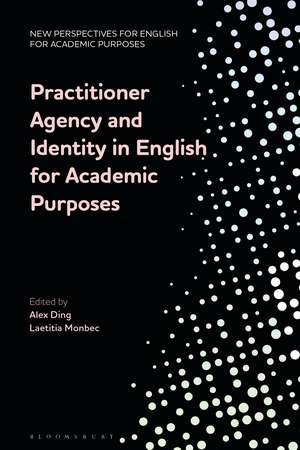Practitioner Agency and Identity in English for Academic Purposes: New Perspectives for English for Academic Purposes
Editat de Dr Alex Ding, Laetitia Monbecen Limba Engleză Hardback – 29 mai 2024
Preț: 540.38 lei
Preț vechi: 774.04 lei
-30% Nou
Puncte Express: 811
Preț estimativ în valută:
103.41€ • 112.29$ • 86.87£
103.41€ • 112.29$ • 86.87£
Carte tipărită la comandă
Livrare economică 23 aprilie-07 mai
Preluare comenzi: 021 569.72.76
Specificații
ISBN-13: 9781350263239
ISBN-10: 1350263230
Pagini: 304
Ilustrații: 10 bw illus
Dimensiuni: 156 x 234 mm
Greutate: 0.54 kg
Editura: Bloomsbury Publishing
Colecția Bloomsbury Academic
Seria New Perspectives for English for Academic Purposes
Locul publicării:London, United Kingdom
ISBN-10: 1350263230
Pagini: 304
Ilustrații: 10 bw illus
Dimensiuni: 156 x 234 mm
Greutate: 0.54 kg
Editura: Bloomsbury Publishing
Colecția Bloomsbury Academic
Seria New Perspectives for English for Academic Purposes
Locul publicării:London, United Kingdom
Caracteristici
Employs concepts from Legitimation Code Theory (LCT) to identify which practices are legitimated, by whom, and the degree to which external forces impact internal practices
Notă biografică
Alex Ding is Associate Professor of English for Academic Purposes and Director of Scholarship at the University of Leeds, UK. Laetitia Monbec is Senior Lecturer in the Centre for English Language and Communication at the National University of Singapore, Singapore.
Cuprins
List of FiguresList of TablesList of ContributorsSeries Editors' ForewordAcknowledgementsIntroduction, Alex Ding (University of Leeds)Part I: Mesocosms1. A Socio-Analysis of EAP, Alex Ding (University of Leeds) and Laetitia Monbec(National University of Singapore, Singapore)2. Collegial Connections and Ethical Entanglements: An Exploration of the Ethics of Scholarship in EAP, Bee Bond (University of Leeds, UK)3. EAP Practitioners in the Global South: Participation, Positioning and Agency in the Context of 'Peripheral' Scholars and Scholarship, Namala Lakshmi Tilakaratna (National University of Singapore, Singapore)Part II: Microcosms4. EAP Practitioners' Identity: From Social Class to Social Capital, Tanzeela Anbreen (University of Bedfordshire, UK) and Samina Ayub(Lahore College for Women University, Pakistan)5. Trials and Tribulations of EAP Practitioners in Zimbabwe, Tambawoga C. Muchena (Midlands State University, Zimbabwe)6. 'Be more Pirate': Harnessing the Power of Liminal Spaces in Creating Academic Literacy Practitioner Identity and Agency, Michelle Joubert and Sherran Clarence (University of the Free State, South Africa)7. Finding Space and Voice: Duoethnographic Exploration of Teacher Agency in EAP, Iwona Winiarska-Pringle (University of Glasgow, UK) and Ania Rolinska (Glasgow School of Art, UK)8. Respected Teachers or a Marginalized, Stigmatized Profession? An Exploration of UK EAP Practitioner Identity, Sarah Taylor (London School of Economics and Political Science, UK)9. EAP Teacher Agency in a Digital Age, Blair Matthews (University of St Andrews, UK)10."Changing Lanes": Balancing between Roles of EAP Lecturer and Researcher in a Teaching Institution towards a Research University, Eric Cheung (College of Professional and Continuing Education, Hong Kong Polytechnic University, Hong Kong)11. Responding to Students' Disciplinary Writing in a University-wide Writing Requirement: Negotiating Agency through Positioning, Shari Dureshahwar Lughmani (PolyU, Hong Kong) and Svetlana Chigaeva-Heddad (Technological and Higher Education Institute of Hong Kong, Hong Kong)12. Power and the Canadian EAP Practitioner: Multiethnography as Resistance? James N. Corcoran (York University, Canada), Jennifer J. MacDonald (Dalhousie University, Canada), Jonathan Mendelsohn and Leonardo Gomes Conclusion: Engaging with Identity and Agency in a Collaborative Project, Laetitia Monbec (National University of Singapore, Singapore)
Recenzii
For any EAP practitioner who has felt marginalized or unseen, this rich collection shows that you are not alone and offers a vocabulary and discourse to begin to articulate the value and agency practitioners hold. Giving space to a refreshing array of voices from around the world, Practitioner Agency and Identity in EAP provides glimpses into researchers grappling with what it means to practice EAP, the ethics of our research, and our positions within the university.
It seems ironic that, while an EAP teaching centre is an indispensable part of a university worth its salt, there is "a growing existential unease" (as Alex Ding puts it) among EAP practitioners regarding their status. The value of this book thus lies in its purpose to give EAP practitioners the identity, agency, and recognition that they rightfully deserve.
Provides an illuminating and insightful series of windows on the identity of the English for Academic Purposes (EAP) practitioner in a range of cultural contexts across the world. Each chapter combines theoretical underpinnings with practical applications, and implements suggestions and recommendations for how EAP teachers' roles can be taken forward. In a globalised world where EAP practice plays an increasingly important role, the reader will come face to face with the challenges and possibilities facing those who are supporting academic language development within Higher Education frameworks.
It seems ironic that, while an EAP teaching centre is an indispensable part of a university worth its salt, there is "a growing existential unease" (as Alex Ding puts it) among EAP practitioners regarding their status. The value of this book thus lies in its purpose to give EAP practitioners the identity, agency, and recognition that they rightfully deserve.
Provides an illuminating and insightful series of windows on the identity of the English for Academic Purposes (EAP) practitioner in a range of cultural contexts across the world. Each chapter combines theoretical underpinnings with practical applications, and implements suggestions and recommendations for how EAP teachers' roles can be taken forward. In a globalised world where EAP practice plays an increasingly important role, the reader will come face to face with the challenges and possibilities facing those who are supporting academic language development within Higher Education frameworks.






